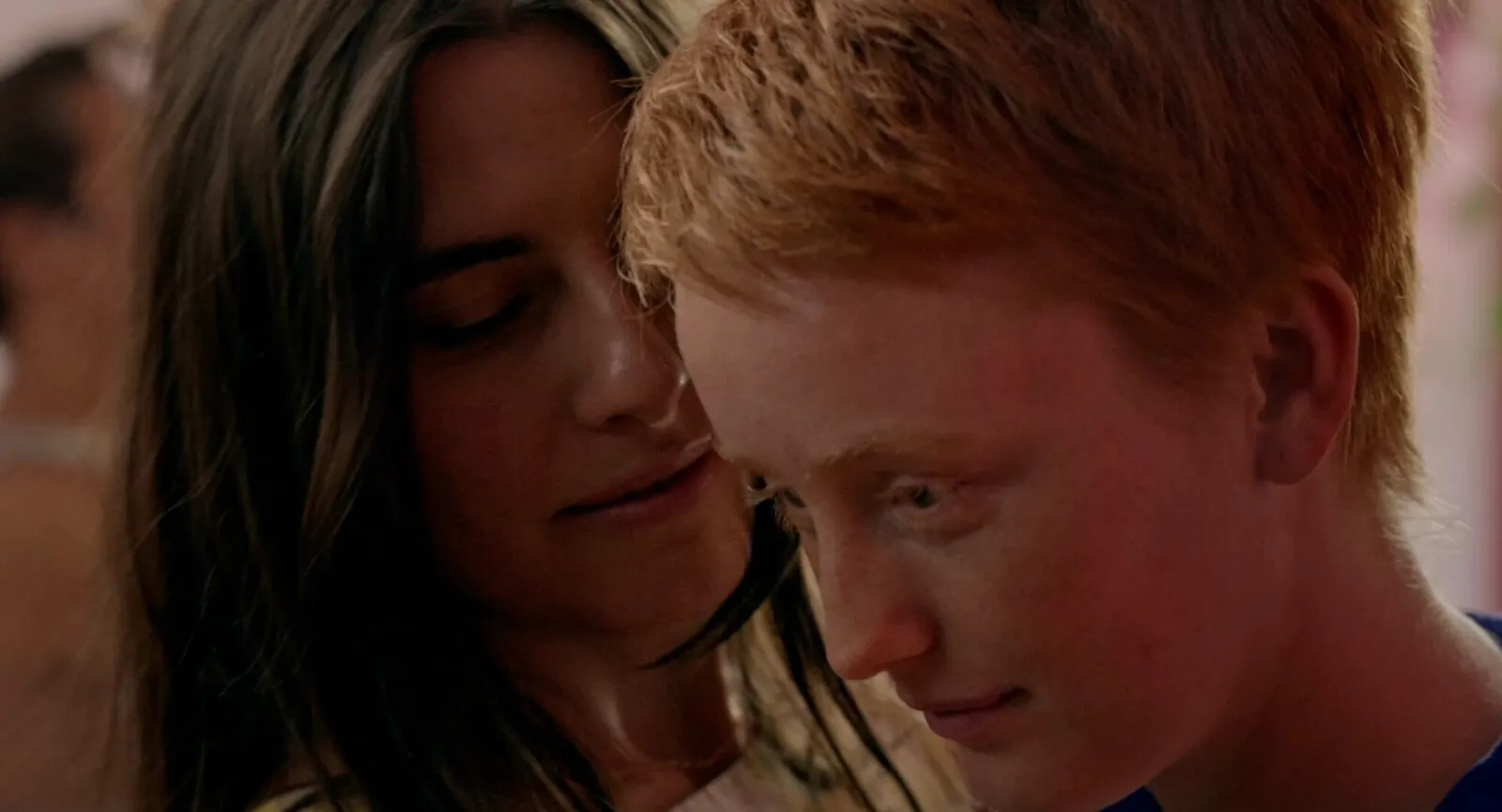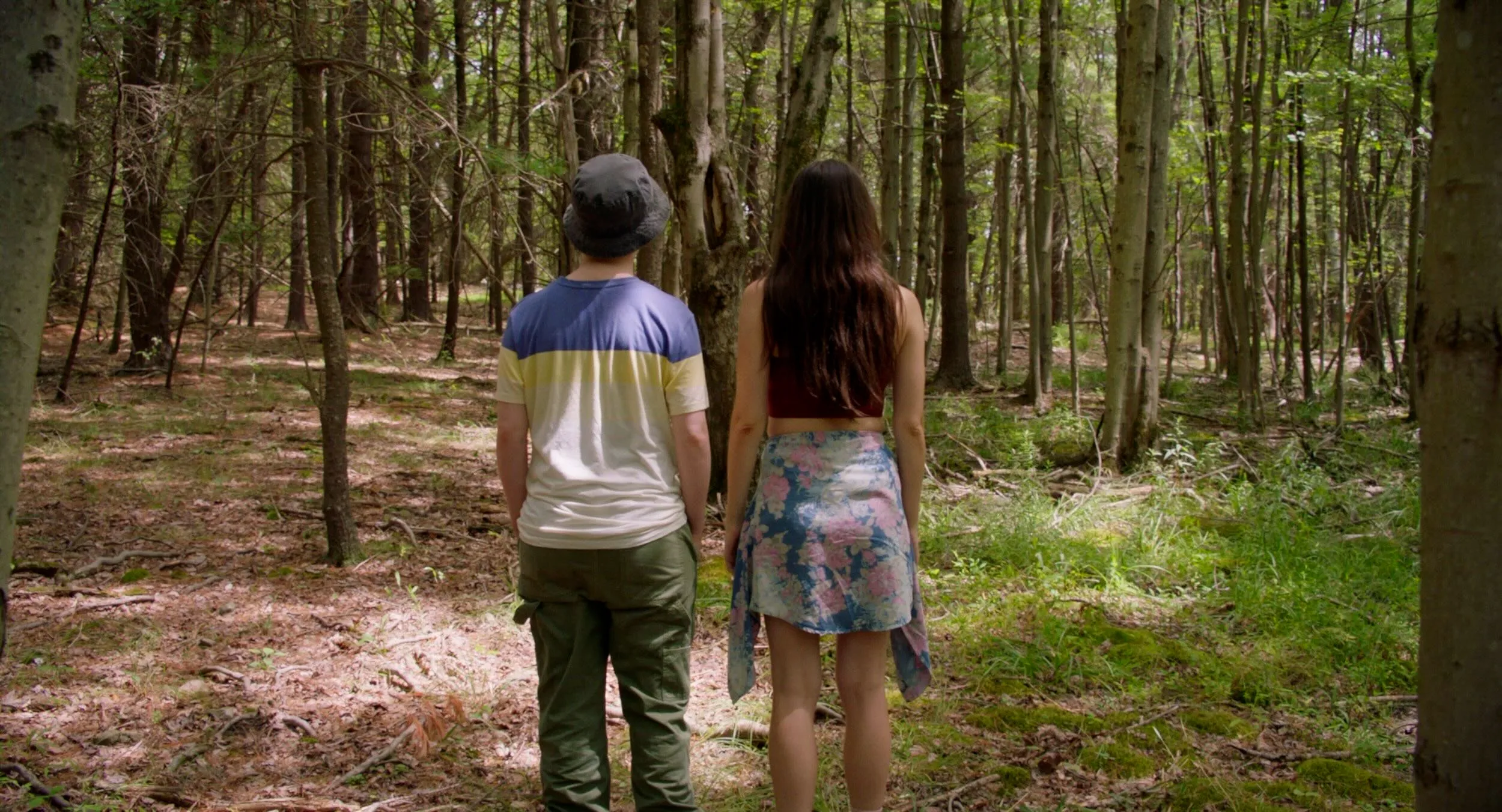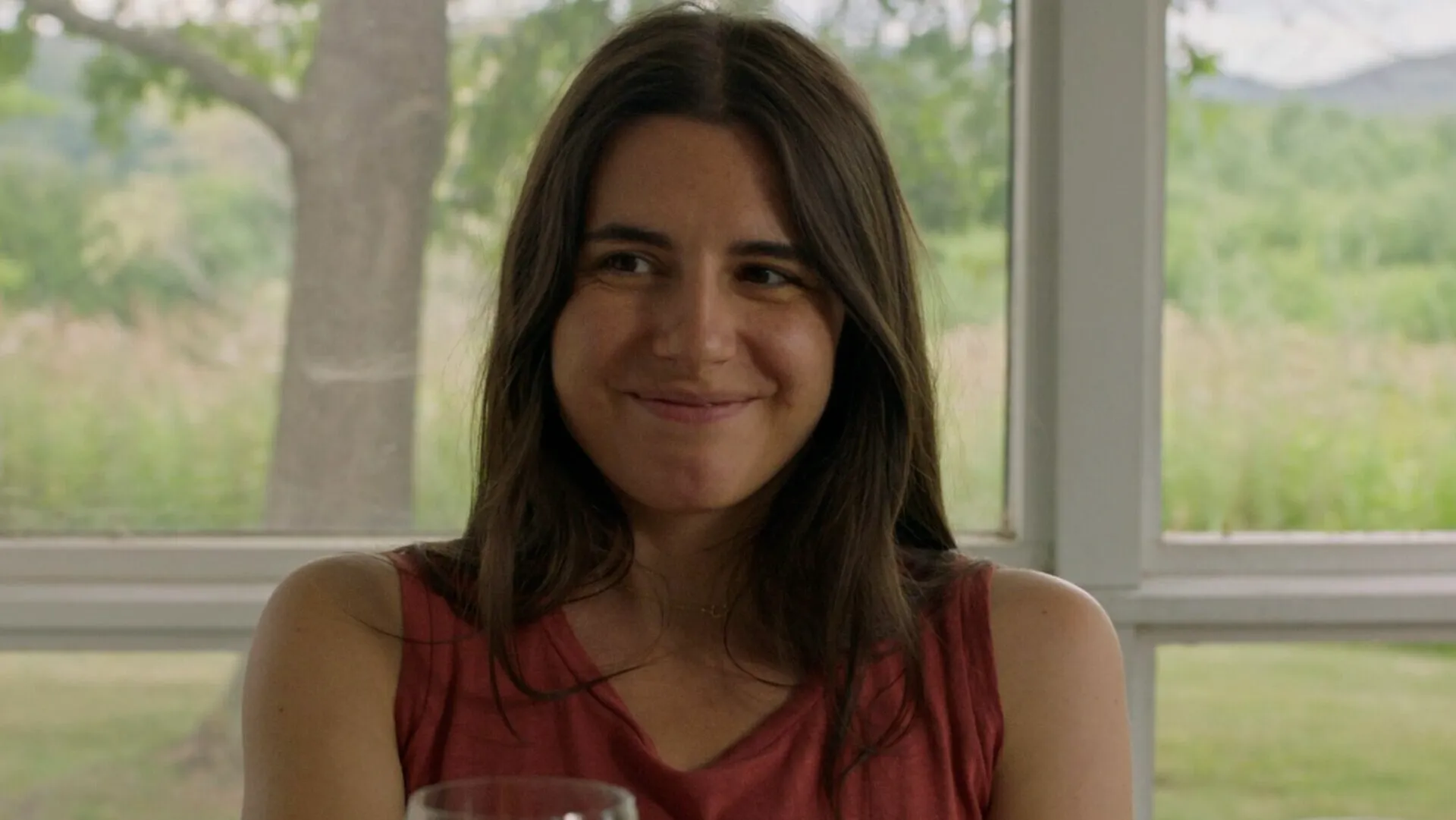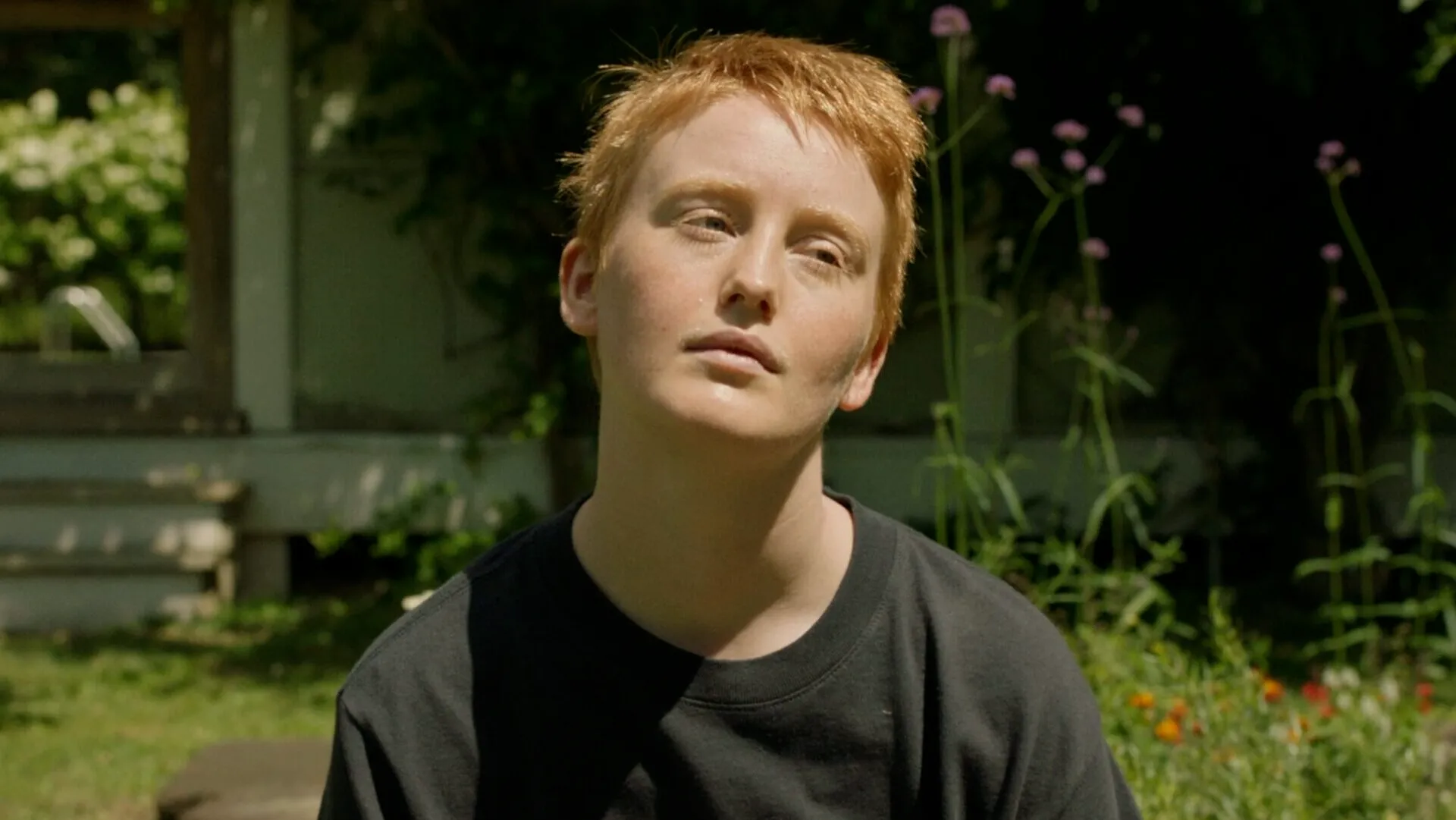Trans actor Leo is struggling to find his footing in New York. Between endless auditions and an unfulfilling relationship, his days blend together in a haze of uncertainty. But when Eleanor—Leo’s boisterous best friend from college—shows up unannounced, she sweeps him away on a spontaneous trip to the countryside. There, surrounded by rolling green hills and sheltering woods, they hope to rediscover the close bond that time and life changes have threatened.
Arriving at a picturesque lakeside cabin, Eleanor jumps right back into their playful dynamic. For Leo, though, navigating this reunion proves complicated. Gradually asserting his queer identity has necessarily altered their friendship’s dynamic. And glimpses of Eleanor’s own instability hint that her carefree facade may veil deeper agonies.
Noah Schamus’ intimate debut subtlety explores these intimate tensions. Shot on a shoestring budget, Summer Solstice prioritizes nuanced performances over cinematic flourishes. Bobby Salvör Menuez and Marianne Rendón bring lived-in empathy to Leo and Eleanor, tracing how understanding each other now demands new conversations. Set against a rustic pastoral backdrop, their character-driven story reminds us that relationships, like the passing seasons, evolve in unforeseeable ways.
Getting Reacquainted
Leo’s certainly got a lot on his mind these days. Between navigating auditions that never seem to go his way and sorting through feelings for Alice that aren’t entirely returned, he’s feeling a bit adrift. So when Eleanor sweeps back into town with an invitation to join her country escape, it’s as good a reason as any to hit pause on real life for a bit.
Eleanor remains as bubbly and bold as ever. All flash and flame one moment, unsure what she really wants next. From the outside, their dynamic seems much the same as in college. But things have changed beneath the surface, especially for Leo since he began living as his authentic self.
Where Eleanor sees their old inside jokes, Leo notices the details she overlooks—like how she still sees him more as the person he was than who he is. It creates an awkward tension that neither is quite willing to address yet. As the weekend rolls on, though, both will find avoiding uncomfortable truths becomes impossible.
Others on this trip provide perspectives beyond Leo and Eleanor’s dynamic alone. Alice represents Leo’s desire for what he can’t have—a carefree romance without question. And Oliver hints at a future Leo could build if he owns his identity fully instead of dimming pieces to please others.
Most fascinating may be how these characters help Leo understand Eleanor in a new light. Was their friendship ever as one-sided as it seems? By trip’s end, both will gain appreciation for how greatly circumstances and people can evolve. In that spirit, they just may find a rekindled closeness too—if they dare to keep growing together rather than dwell in the past.
Journey of Self-Discovery
A central theme of Summer Solstice lies in its exploration of identity. Both Leo and Eleanor find themselves treading uncertain ground regarding who they are and want to become. Gone are the days when Leo simply filled the role Eleanor assigned. Transitioning prompted a deeper understanding of his authentic self.
Their rekindled dynamic raises complex questions about how transition shifts dynamics within cherished relationships. The film delves into this with nuance, never reducing issues to simple answers. Leo struggles to balance newfound confidence against nostalgia for past closeness. Eleanor, too, faces her own identity crisis as societal expectations clash with care for Leo.
Their journey gains poignancy through its thoughtful depiction of queerness. Where many stories sensationalize, Summer Solstice presents queer love and community with utter normalcy. It finds beauty in the small, everyday moments of mutual understanding between people often denied that luxury.
And in its handling of Eleanor’s journey from unaware ally to authentic supporter, the film avoids judgmentalism. Her missteps feel genuine, as do efforts to grow wiser through compassion. Overall, the narrative proves representation holds power to change hearts by showing rather than scolding.
What resonates is the feeling that Schamus sees his characters as whole people, not symbols. Flaws and all, their humanity comes through in a way anyone can relate to. This emotional authenticity gives the intimate themes explored real staying power, leaving reflection in its quiet wake.
Seasons of Self-Discovery
Noah Schamus brings a keen sensitivity to navigating Summer Solstice’s delicate themes. With gentle assurance, they allow moments of quiet reflection among this tale of souls reckoning with inner change. Schamus recognizes that life’s deepest inquiries often emerge from what lies unspoken, and their direction trustingly fills such spacings with resonant meaning.
Bobbi Salvör Menuez delivers a performance that lingers in memory. As Leo navigates self-discovery’s tides with gentle grace, he invites viewers to walk alongside in shared wonder at life’s journey. Menuez’ warm and earnest presence gives Leo’s every action resonance, from joy’s faint stirrings to doubts demandingly held at bay. His work brings stirring fullness to a character’s hopeful coming into his own.
As Eleanor, Marianne Rendón breathes vivacious layers into a soul grasping to understand herself amid another’s metamorphosis. Hers is no simple part: Eleanor teeters between ardent care, willful blindness, and hard-won clarity. Rendón navigates these shiftings with cunning care, at times charming, others challenging us to a broader view. Her shining accomplishment, like Schamus’ film, lies in compassionately complicating presumptions regarding life’s intertwined travelers.
Together, director and performers weave quiet magic. Their gift lies not in answers but authentic glimpses of humanity—as complex, contradictory, and wonderfully resilient in crisis as life’s own seasons. Through their artistry, “Summer Solstice” warmly reminds us that however far we wander, home remains in shared wanderings of the spirit.
Fields of Reflection
Noah Schamus brings a painter’s eye to Summer Solstice. Through director of photography Jack Davis, their rural setting becomes a canvas where inner journeys unfold. Rolling pastures and shadowed woods don’t merely set a bucolic stage but shape the film’s quietude.
Davis’ cinematography embraces the simplicity of his environs. With intimate close-ups and wandering mid-shots, he invites viewing each expression, gesture, or awkward moment as a revelation. Subtle visual poetry evokes the characters’ solitude, whether ruminating alone or interacting amid open spaces.
These pastoral backdrops enhance reflection on identity and acceptance and the pain of self-discovery. Removed from urban distractions, Leo and Eleanor confront hardened assumptions and feelings long left unsaid. Their surroundings mirror changing weather within, intimate turmoil hinted through fleeting glimpses of faces weathering inner storms.
Schamus’ low-budget roots gift room for such nuanced performances to emerge unfettered. Stripped of pretense, camerawork prioritizes actors’ raw truths. In trading bombast for candor, visuals deepen appreciation of these souls’ journey from confusion to understanding, lost then found within supportive company and the calm of nature’s embrace.
Overall, Summer Solstice shows that simplicity need not mean lacking depth or artistry. Through sensitive direction and location, it locates profundity in life’s ordinary moments, inviting viewers to peer within and find shared experiences by lantern-light of hearts illuminated, if only for a fleeting solstice sun.
Speaking to the Soul
Summer Solstice tells a quietly profound story. Through its authentic characters and handling of nuanced themes, the film speaks to our shared humanity. Schamus presents trans experiences with disarming normalcy, inviting understanding of lives often rendered invisible.
Leo’s journey feels soothingly familiar. In his hopes, mistakes, and hard-won growth, viewers see reflected life’s common battles against societal confines. His calm sincerity lets audiences connect through our similarities rather than dwell on differences. And by inviting laughter at relational awkwardness we all know, the film spreads joy’s balm.
This approach feels profoundly thoughtful. Where controversy could have arisen, care was taken to prioritize compassion. Even difficult discussions feel more yielding as a result. The patience of Schamus and Cast reassures change emerges through gentle persuasion, not aggression.
Most poignant is how the film acts not as a pronouncer of truths but as a as a mirror for self-reflection. By showing lives evolving outside expectation yet within, it inspires reconsidering prejudices tightly or loosely held. Eleanor’s arc in particular reminds us that ignorance stems not from malice but from a from a lack of exposure, remedied by open-mindedness.
Overall, Summer Solstice lingers in memory like fine art, lingering impressions replacing fleeting sensations. Its characters feel familiar as neighbors, guiding us to cherish in others what we wish for ourselves—to be seen, and see too, with empathy’s eyes. In quietly glowing, thus may this small film achieve grandeur and continue inspiring through shared experiences of the human soul it so skillfully captures.
Quiet Triumphs of the Heart
Noah Schamus’ intimate debut resonates long after its final moments fade. With simplicity and care, Summer Solstice portrayed trans lives in all their messy beauty and complexity. At its core lie truths about the shared human experiences of forging identity amid change and cultivating understanding between kindred souls.
Leo and Eleanor’s journeys highlighted life’s capacity for surprise. Their willingness to walk unfamiliar roads together, despite stumbles, demonstrated relationships’ ability to deepen through honesty and growth and the patience it demands. Witnessed alongside vivid supporting characters, their story proved diversity strengthens community, not divides it, when approached with open eyes and ears.
Most of all, Schamus invited viewers into thoughtful reflection on perceptions and assumptions. By prioritizing authentic glimpses of courage, vulnerability, and humor over sensationalism, they reminded society’s scope widens through respecting others’ journeys as uniquely their own. In crafting a love letter to compassion, Summer Solstice quietly reaffirmed art’s power to forge bonds and open minds through glimpses of our shared humanity.
For anyone seeking an antidote to division or wishing to broaden perspectives, this gem offers just that. Its gentle light shines as a beacon for bringing more authentic representations to screens and, in turn, cultivating greater understanding across differences within communities. Some cinematic gifts stay with the soul long after the final credits roll.
The Review
Summer Solstice
With remarkable care and empathy, Summer Solstice crafts an intimate character study that resonates long after viewing. Schamus' debut proves trans stories deserve prominence for their power to build bridges between diverse experiences.
PROS
- Nuanced performances that feel authentic
- Focus on subtlety over sensationalism.
- Thoughtful exploration of identity and relationships
- Promotes understanding of trans experiences
- Intimate rural setting enhances introspective tone
CONS
- Pacing drags at times.
- Romantic subplots could be stronger
- Low budget limits visual polish




















































Discussion about this post